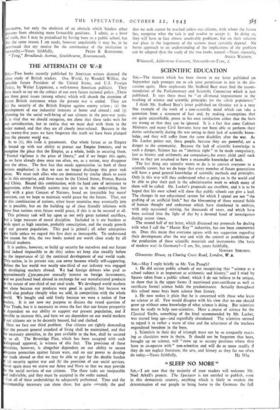THE AFTERMATH OF WAR
ut,—Two books recently published by American writers demand the close study of British readers. One World, by Wendell Willkie, the possible future President of the United States, and U.S. Foreign Policy, by Walter Lippmann, a well-known American publicist. They ave much to say on the subject of our own future national policy. .There re three great issues (among others) which will absorb the attention of
uture British statesmen when the present war is ended. They are 1) the security of the British Empire against enemy action ; (2) the velopment of our industrial interests at home and abroad ; and (3) planning for the social well-being of our citizens in the post-war years. t is vital that we should recognise, not alone that these tasks wait for ur consideration, but to realise that we must deal with them in the rder named, and that they are all closely inter-related. Because in the ast twenty-five years we have forgotten this truth we have been plunged to the present world war.
As to (r), this issue is paramount. Our whole future as an Empire s bound up with our ability to protect our Empire frontiers, and to ecognise the place that the Empire, as a whole, holds in securing them.
Eternal vigilance is the price of liberty," and if we forget this again, s we have already done once too often, we, as a nation, may disappear o the abyss. The first fact that needs appreciation (as both of these riters emphasise) is that we can no longer discharge this great task lone. We must seek allies who are dominated by similar ideals to assist
s in this enterprise, and these must be the United States, France, Russia nd China. Round this combination, with its hard core of resistance to
ggression, other friendly nations may join us in the undertaking, but
nly with a great Concert of Nations, based on irresistible but moral oercion, can we hope to maintain world peace for the future. That, out this combination of nations, other lesser countries may eventually join s is possible, but on the building up of close friendly relations with ese four nations rests future world peace, if this is to be secured at all.
This primary task will lay upon us not only great national sacrifices, ut a large measure of moral discipline. Included in it are burdens as "de apart as high taxation, probably conscription, and the steady growth f our present population. This goal is primal ; all other enterprises e futile unless we regard this first duty as inescapable. To understand e reason for this, the two books named are worth close study by all itical students.
It is useless, however, to build up security for ourselves and our future and indeed impossible to do this) unless we keep also steadily before s the importance of (2) the continual development of our world trade. s nation, in its present size, can never become wholly self-supporting. efore the last world war nearly one-third of our industry was engaged developing markets abroad. Vl.e had foreign debtors who paid us pproximately ,C300,000,000 annually interest on foreign investments, d we purchased food abroad in exchange for our manufactured products o the extent of one-third of our total trade. We developed world markets alone because our products were good in quality, but because we uld also produce cheaply what we sold, in competition with the whole rid. We bought and sold freely because we were a nation of free aders. It is not now my purpose to discuss the vexed question of ee Trade, but it is necessary to stress the fact that our future prosperity dependent on our ability to support our present population, and if sible to increase this, and here we are dependent on our world markets our citizens are to be decently housed, fed and clothed.
Here we face our third problem. Our citizens are rightly demanding at the present general stapdard of living shall be maintained, and that
e necessary amenities, in the past available to the few, shall be secured
y us all. The. Beveridge Plan, which has been accepted with such idespread approval, is witness of this fact. The provision of these en ties, however, is altogether dependent on our ability to secure equate protection against future wars, and on our power to develop
r trade abroad so that we may be able to pay for the double burden
f (a) security against war and (b) the provision of our social services. ever again must we starve our Army and Navy so that we may provide r the social services of our citizens. The three tasks are inseparable nd indivisible, and they must be accepted in the order named.
Can all of these undertakings be adequately performed. Time and the atesmanship necessary can alone show. but quite certainly the goal that we seek cannot be reached unless our citizens, with whom the future lies, recognise what the task is and resolve to accept it. In doing so, they will have to face almost unsolvable problems, but on their solution our place in the hegemony of the nations must certainly depend. No better approach to an understanding of the implications of the problem can be adopted than the study of the two books named.—Yours sincerely, ANGUS WATSON. Whitewell, Adderstone Crescent, Newcastle-on-Tyne, 2.


























 Previous page
Previous page